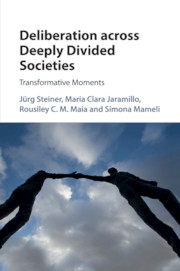Book contents
- Deliberation across Deeply Divided Societies
- Reviews
- Deliberation across Deeply Divided Societies
- Copyright page
- Dedication
- Contents
- Introduction
- 1 The Collection of the Empirical Data
- 2 Personal Stories and Deliberative Transformative Moments
- 3 Rationality and Deliberative Transformative Moments
- 4 Humor, Sarcasm, and Deliberative Transformative Moments
- 5 Muteness and Deliberative Transformative Moments
- 6 Deliberative Leaders
- 7 Deliberative Spoilers
- 8 Outcomes and Deliberative Transformative Moments
- Conclusion
- Index
8 - Outcomes and Deliberative Transformative Moments
Published online by Cambridge University Press: 30 March 2017
- Deliberation across Deeply Divided Societies
- Reviews
- Deliberation across Deeply Divided Societies
- Copyright page
- Dedication
- Contents
- Introduction
- 1 The Collection of the Empirical Data
- 2 Personal Stories and Deliberative Transformative Moments
- 3 Rationality and Deliberative Transformative Moments
- 4 Humor, Sarcasm, and Deliberative Transformative Moments
- 5 Muteness and Deliberative Transformative Moments
- 6 Deliberative Leaders
- 7 Deliberative Spoilers
- 8 Outcomes and Deliberative Transformative Moments
- Conclusion
- Index
Summary
- Type
- Chapter
- Information
- Deliberation across Deeply Divided SocietiesTransformative Moments, pp. 235 - 251Publisher: Cambridge University PressPrint publication year: 2017



